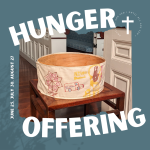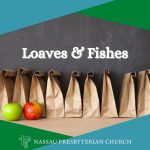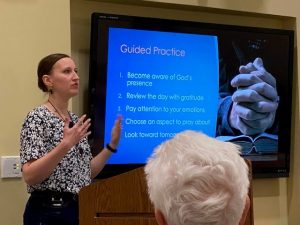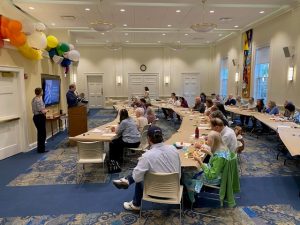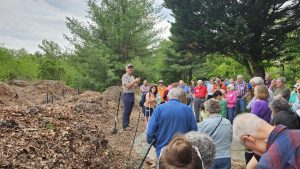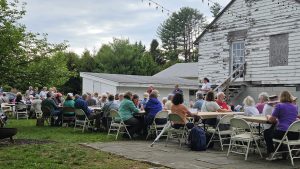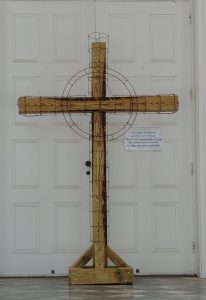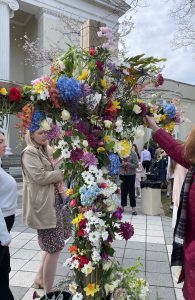Revelation 22:1-5
May 25
Len Scales
Jump to audio
For those of us who were journeying through the season of Lent with Nassau, we will remember that we started with the beginning of Genesis and found our way through the Garden of Eden. In the garden, there was a tree of life.
Now near the end of the Easter season, we are in the last chapter of Revelation. We’ve gone from the starting point of the Bible to its conclusion and we are in a beautiful city, radiating because of God’s light, the Lamb of God sits on the throne and living water of crystal flows through the city. Here, the tree of life reappears, and this time it’s not one tree eventually cordoned off from humanity, but an arcade with the tree of life on either side of the river, and it bears fruit continually, the abundance is new in every month, and the leaves of the tree are for the healing of the nations.
Brian Blount in his commentary on Revelation, points out “John’s new Jerusalem out-Edens Eden!”[1]
God’s proclamation of all of creation as “very good” in Genesis is bookended here with healing of the nations. God’s healing is not for 1 individual, nor is it for 1 group of people, it is inclusive and sufficient for all.
It can be hard to imagine the healing of the nations when we know there is such grave suffering being inflicted across the world. Children are cut off from humanitarian aid, hospitals attacked, corruption and violence seem to take the day all too often.
Revelation was written when Rome was teetering on the edge of self-destruction due to its injustices.[2]
While the new Jerusalem with perpetual light, life-giving water, and leaves of healing may seem far off from our imagination, perhaps that wider context doesn’t. There are injustices in every age that are moral wounds in society. So much so that it can be hard to metabolize all the horror in our news cycle, lack of care for the neighbor in our country, and personal losses we each experience.
The tree of life along with the crystal river flowing from the throne of God is a relief and a promise. When the wild world seems to be spinning apart, we are led back to the refreshing waters provided by God. This image, this promise is not made so that we can hang back and say God’s got it and not do anything in response. It gives us a reassurance of what will be and a model of what we can work toward.
One of the greatest gifts of working with the campus ministry Princeton Presbyterians is seeing the diversity of how students and alums follow God’s call to “do justice, love kindness, and walk humbly.” There isn’t one profession or one region of the world that is the center of what God is doing. Rather, through the power of the Holy Spirit, God can be at work anywhere. We have the privilege of seeing the goodness of God everywhere the fruits of the Spirit are present—love, joy, peace, patience, kindness, goodness, faithfulness, gentleness, and self-control.[3]
We can test what is of God and what is not by whether healing is a part of the impact. So where people’s access to healthcare and food and housing are cut off, that is not where God is leading us. Where creation is abused, that is not of God. God is present in the support of community, the flourishing of creation, a vision for life-giving future.
John is caught up in a dream in Revelation, he is angry at the injustices tearing his people and community apart. In the midst of the rubble, he is taken up and shown an apocalyptic story. It is not polite, nor the maintenance of the status quo. It is a complete turning over of all that is against God and a prophetic call for repentance. In the end, John is shown the vision we read today—a city of God, the Lamb that laid his life down for us all is sitting on the throne. There is no need to have gates that protect or fear of running out of water or fruit. There is abundance with a promise of healing what is broken and hurting and raw.
Revelation comes to John when it seems like life is falling apart. It is then the angel shows up and reveals a promise that imagines a new world.
In her book, Imagination: A Manifesto, Ruha Benjamin calls on the power of collective imagination to bring about a life-giving world. The stories we tell and the dreams we fan matter. Benjamin says, “So, one of the things we can all do starting yesterday is to actively work to topple the steel curtains and bulldoze the wire fences lurking in our own imaginations—confronting the treacherous ‘aliens’ and dangerous boogeymen distorting how we see others and warping how we understand ourselves. … We must populate our imaginations with images and stories of our shared humanity, of our interconnectedness, of our solidarity as people—a poetics of welcome, not walls.”[4]
So where are those positive avenues for your imagination to run? Is it through reading or enjoying art or playing with a three-year-old or listening to a young person share their vision for the world? Where might God be catching us up into a vision that is beyond the horizon of what we can see on earth? Who are the conversation partners that help you envision a world that is in line with the love and justice of God?
I invite you to take moment, stare out the windows and daydream.
A worship space like this is built with clear windows so that the world can see the church at worship, AND it also allows the church to look out at creation.
The leaves of these trees on either side of the chapel help change the color scape in each season. Whether it is buds in the spring, steady green in the summer, the turning of leaves in the fall, or the bare branches in the winter, these trees stand as testament to God’s good creation.
See God’s goodness and hear God’s vision:
Then the angel showed me the river of the water of life,
bright as crystal,
flowing from the throne of God and of the lamb
through the middle of the street of the city.
On either side of the river is the tree of life
with its twelve kinds of fruit, producing its fruit each month,
and the leaves of the tree are for the healing of the nations.
May it be so.
[1] Brian Blount, The New Testament Library: Revelation, (Westminster John Knox, 2009) 397.
[2] Christianity and White Supremacy: Heresy and Hope Conference at Princeton University, opening panel in the University Chapel, March 20, 2019.
[3] Galatians 5:22-23
[4] Ruha Benjamin, Imagination: A Manifesto, (W. W. Norton & Company, 2024) 102.

